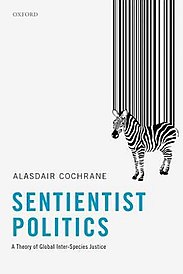 | |
| Author | Alasdair Cochrane |
|---|---|
| Working title | Beastly Cosmopolitanism: A Theory of Global Inter-Species Justice |
| Subjects | |
| Publisher | Oxford University Press |
Publication date | 30 October 2018 |
| Publication place | United Kingdom |
| Media type | Hardback; softback; ebook |
| Awards | 2019 Susan Strange Best Book Prize (BISA) |
Sentientist Politics: A Theory of Global Inter-Species Justice is a 2018 book by the English political theorist Alasdair Cochrane, published by Oxford University Press. In the book, Cochrane outlines and defends his political theory of "sentientist cosmopolitan democracy". The approach is sentientist in that it recognises all sentient animals as bearers of rights; cosmopolitan in that it extends cosmopolitan political theory to include animals, rejecting the importance of state borders and endorsing impartiality; and democratic in that it aims to include animals in systems of representative and cosmopolitan democracy. It was the first book to extend cosmopolitan theory to animals, and was a contribution to the "political turn" in animal ethics – animal ethics informed by political philosophy.
Sentientist Politics was inspired by Cochrane's hope to take discussions of animal rights beyond questions about how animals may be treated to how politics would have to change if animal rights were recognised. For him, the only previous substantial exploration of this question was in Sue Donaldson and Will Kymlicka's Zoopolis, of which Cochrane had earlier published a cosmopolitan critique. Research for Sentientist Politics was funded by a grant from the Leverhulme Trust, and work on international intervention on behalf of animals was conducted with Steve Cooke. Sentientist Politics was published on 30 October 2018, with a launch event at the University of Sheffield.
For the book, Cochrane was awarded the 2019 Susan Strange Best Book Prize by the British International Studies Association. Sentientist Politics was the subject of a symposium in the journal Politics and Animals, and praised by commentators for its readability, strength of argument, and ambition. It provoked questions about methodology in animal-rights scholarship, aid to wild animals, and the possibility of sentientist constitutionalism.